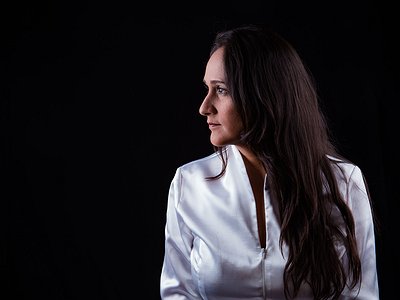Part 1
Name: Simone Menezes
Nationality: Italian-Brazilian
Occupation: Conductor/composer
Current Release: Metanoia on Accentus
Recommendations: The documentary that accompanies Metanoia / The poetry of Elizabeth Barrett Browning “Earth's crammed with heaven...But only he who sees, takes off his shoes.”
If you enjoyed this interview with Simone Menezes learn more about her career and upcoming concerts at her website www.simonemenezes.com
When did you start conducting, and what or who were your early passions and influences? What was it about music and/or sound that drew you to it?
My father was an air traffic controller and an amateur choir conductor. Since I was little, aged 7, I studied music, and sang in choirs. I remember that at the age of 15, I was already giving rehearsals and conducting amateur choirs.
I’ve been passionate about Beethoven since I was a child and my conductor model at the time was Claudio Abado, Sao Paulo was very cosmopolitan at that time. I was a big fan of bossa nova, jazz, and contemporary art, I loved museums.
For most artists, originality is preceded by a phase of learning and, often, emulating others. What was this like for you: How would you describe your own development as a conductor and the transition towards your own approach?
The tradition and excellence of classical music are two very strong values for me. My dream was to be in Europe, to be able to see the waltzes in Vienna to better understand Mahler, Debussy, see the impressionist paintings.
I had several models and tried to "enter" in the system. At this point, after a very solid learning phase, the milestone was my meeting with Paavo Jarvi, who in a way, did with me a little of what Nadia Boulanger did with her students. He encouraged me as an artist to be Simone, having what would be my faults (the cosmopolitan vision, the atypical history, curious spirit, intellectual profile) as a force.
How do you feel your sense of identity influences your creativity?
In the recent documentary "The Creative Brain", one of the concepts explored is that when we have different experiences in different places, different areas of interest, we naturally make parallels all the time, and when you keep an open vision, creative ideas arise.
In the traditional route of a classical musician, frequently we have a demand for many hours of study a day which can, in some cases, lead us to restrict other interests and consequently the creativity, bringing a conservative and less creative attitude. I have lived in such different cultural and artistic contexts and I believe that has contributed to a more creative approach.
What were some of your main artistic challenges when starting out as a conductor and in which way have they changed over the years?
At the beginning of my career, the biggest challenge was the “invisibility”. My male peers were invited by the orchestras, and I was not. To overcome this invisibility, I created my own orchestra, which was not my privilege, most of the female conductors established today also had to create their own ensembles in order to break through.
Thank God, this reality has changed rapidly in the last 5 years. But we are still in the process... interestingly, there is still resistance in certain institutions because they see a woman in leadership as a risk.
I don't see it as "bad intentions"; it’s more a matter of a paradigm shift. When my parents were children, they avoided going to see a female doctor, they felt safer with a male doctor. Today this is no longer a taboo. I believe this is now happening in my field and many others.
As creative goals and technical abilities change, so does the need for different tools of expression. Can you describe this path for you, starting from your first instrument to becoming a conductor?
I never thought about that. I was always a little jealous of the great pianists, who alone could build a complete and organic interpretation. This idea of uniqueness, many parts forming a unity, alignment, completeness, and building something with a truly organic agogic is what attracts me to conducting. Interpreting a work as a conductor is like picking up a manual on how to make a painting and carefully following it part by part. You have the recipe, but you have a little freedom to choose between two shades of yellow nearby, and these little pleasures of interpretation are very precious to me.
Tell me about your "instrument", the baton, please. How would you describe the relationship with it? How does conducting influence the musical results of the ensemble?
Two conductors with the same orchestra are like two pianists with the same piano, it can sound completely different.
How would you describe your approach to interpretation? Where do you start and how do you develop your view on a piece, what are some of your principles and what constitutes a successful interpretation for you?
There are many pleasures in the regency process. When I have a new score in my hands, the first thing I do is study the whole context in which it was written (before even looking at the notes), historical, personal, intellectual, emotional.
Second, I will learn the work, I will try to learn it until I can sing it in full. Third, I make decisions, tempo, colours, transitions, architecture.
Then after that comes the meeting with the orchestra, in this process, I present my ideas through my gestures. Some musicians propose other ideas with their instruments, sometimes if their ideas are good and consistent with the vision, I follow them, I try to create a coherent unity that links up with the first step of understanding the work.





